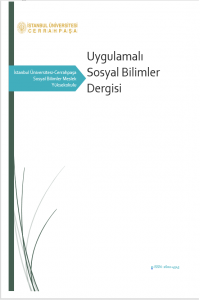KYOTO PROTOKOLÜ UYGULAMA MEKANİZMALARI:KUSURLU MU YOKSA UMUT VERİCİ KAVRAMLAR MI?
OZETKyoto Protokolu bazı aydınlar tarafından ovguyle karsılanırken bazıları tarafından da elestirilmektedir. Bu makale, formel olmayan bir oyun teorisi analizi uzerine kurulan kontrol ve uyumsuzluk prosedurlerini icinde barındıran uygulama mekanizmalarını ele almaktadır. Kontrol sisteminin daha once gorulmemis duzeyde bir kapsamlılık gosterdiği one surulmektedir. Ayrıca uyumsuzluk prosedurleri de caydırıcılık potansiyeli ve guvenilirliği bakımından -hala gelistirilmesi gereken noktalar olsa bile- dikkate değer bir kalite duzeyine ulasmıs gorunmektedir (Ozellikle cevreyle ilgili gecmisteki uluslararası anlasmalarla karsılastırıldığında). Yapılabilecek iyilestirmeler ana hatlarıyla belirtilmis ve eklenebilecek uyumsuzluk prosedurleri onerilmistir.
Anahtar Kelimeler:
Kyoto Protokolü, Kontrol, Uyumsuzluk Prosedürleri
___
- Böhringer, C., Finus, M.: The Kyoto protocol: success or failure? In: Helm, D. (ed.) Climate-Change Policy, pp. 253–281. Oxford Economic Press, Oxford (2005)
- Chayes, A.H., Chayes, A.: On compliance. Int. Organ. 47, 175–205 (1993)
- Downs, G.W., Rocke, D.M., Barsoom, P.N.: Is the good news about compliance good news about cooperation? Int. Organ. 50(3), 379–406 (1996)
- Eaton, J., Engers, M.: Sanctions. J. Political Econ. 100, 899–928 (1992)
- Endres, A., Ohl, C.: Kyoto Europe? An economic evaluation of the European emission trading directive. Eur. J. Law Econ. 19, 17–39 (2005)
- Farrell, J., Maskin, E.: Renegotiation in repeated games. Games Econ. Behav. 1, 327–360 (1989)
- Faure, M., Lefevere, J.: Compliance with glo- bal environmental policy. In: Axelrod, R.S., et al. (eds.) The Global Environment. Institutions, Law, and Policy, pp. 163–180. CQ Press, Washington (2005)
- Finus, M.: Game theory and international environmental cooperation: any practical application? In: Böhringer, C., Finus, M., Vogt, C. (eds.) Controlling Global Warming: Perspectives from Economics, Game Theory and Public Choice, pp. 9– 104. Edward Elgar, Cheltenham (2002)
- Finus, M.: Stability and design of international environmental agreements: the case of global and trans- boundary pollution. In: Folmer, H., Tietenberg, T. (eds.) International Yearbook of Environmental and Resource Economics 2003/4, pp. 82–158. Edward Elgar, Cheltenham (2003)
- Folmer, H., de Zeeuw, A.: International environmental problems and policy. In: Folmer, H., Gabel, H.L. (eds.) Principles of Environmental and Resource Economics: A Guide for Students and Decision-makers, Cheltenham (2000) 447–478. Edward Elgar,
- Hagem, C., et al.: Enforcing the Kyoto protocol: sanctions and strategic behavior. Energy Policy 33, 2112– 2122 (2005)
- Heister, J., et al.: Strategies to enforce compliance with an international CO2 treaty. Int. Environ. Aff. 22, 22–53 (1997)
- Kallbekken, S., Hovi, J.: The price of non- compliance with the Kyoto protocol: the remarkable case of Norway. Int. Environ. Agreem. Politics Law Econ. 7, 1–15 (2006)
- Kirchgässner, G., Mohr, E.: Trade restrictions as viable means of enforcing compliance with international assessment. Environmental Standards: Economic Mechanisms as Viable Means? Springer, Heidelberg (1996) economic Enforcing Wolfrum,
- Mlicki, P.P.: Hostage posting as a mechanism for cooperation in the prisoner’s dilemma game. In: Liebrand, W.B., Messick, D.M. (eds.) Frontiers in Social Dilemmas Research, pp. 165–183. Springer, Berlin (1996)
- Mohr, E.: On the incredibility of perfect threats in repeated games: note. Int. Econ. Rev. 29, 551–555 (1988)
- Ress, G.: Ex ante safeguards against ex post opportunism in international treaties: theory and practice of international public law. J. Inst. Theor. Econ. 150, 279–303 (1994)
- Stranlund, J.K.: The regulatory choice of noncompliance Environ. Resour. Econ. 38, 99–117 (2007) trading programs.
- Victor, D.G.: The operation and effectiveness of the Montreal protocol’s non-compliance procedure. In:
- Victor, D.G., Raustiala, K., Skolnikoff, E.B. (eds.) The Implementation and Effectiveness of International Environmental Commitments—Theory and Practice, pp. 137–176. MIT Press, Cambridge (1998)
- Başlangıç: 2007
- Yayıncı: İstanbul Üniversitesi-Cerrahpaşa
Sayıdaki Diğer Makaleler
İKLİM DEĞİŞİKLİĞİ İLE MÜCADELEDE ULUSLARARASI İŞBİRLİĞİNİN ÖNEMİ
Evolution of Corporate Governance in the United States of America
BİR KONFEKSİYON İŞLETMESİNDE SİPARİŞ MALİYET SİSTEMİ UYGULAMASI
İSTANBUL'DA KAPALI SİTE KONUT FİYATLARININ ANALİZİ
PARA POLİTİKASININ DÜNÜ VE BUGÜNÜ
KÜMELENMENİN TEORİK TEMELLERİ VE İKTİSADİ ETKİLERİ
SWITCHING TO IFRS 8 AND ITS IMPACT ON THE TURKISH LISTED COMPANIES
MEASURING THE EFFICIENCY OF PORTFOLIOS WITH DATA ENVELOPMENT ANALYSIS
VERGİ AFLARININ HUKUKi NiTELİĞİ VE GEREKÇELERi
INVESTIGATION OF LONG-RUN REAL EXCHANGE RATES: THE CASE OF TURKEY
